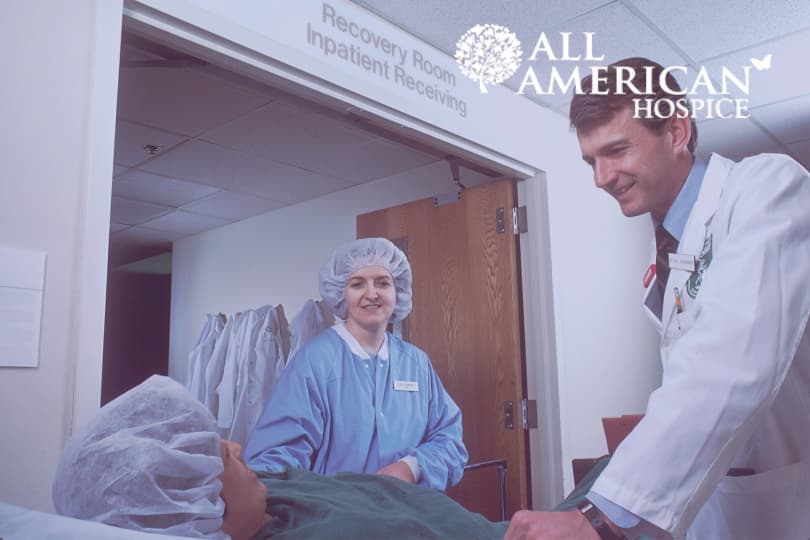Table of Contents

We all hope for extra time with our aging parents or grandparents. The medical interventions we give to our loved ones can only prolong their life for a short time. While the form and timing of end-of-life care vary from person to person, many families discover that sooner is better.
Hospice care decisions can be tough and time-sensitive. Understanding when to call and how to qualify for hospice and these organizations’ resources can help reduce anxiety and confusion surrounding these vital decisions.
When to Call Hospice
To ensure that patients and their loved ones can take advantage of all that hospice offers, hospice experts should be called as soon as a patient’s condition becomes terminal.
Anyone of any age can call hospice and get care if a physician certifies that they have a life expectancy of six months or less, based on the progression of their illness. People with a life-limiting illness or those nearing the end of their lives could benefit from hospice care.
In hospice, the focus is on quality of life rather than recovery. In most cases, hospice care is needed when the primary goal of treatment is to alleviate pain and other uncomfortable symptoms rather than cure a disease or condition.
When to Put Someone in Hospice
When is a person ready for hospice? This can be determined if they display the signs and symptoms described below.
Frequent Hospitalizations
One of the most obvious signals that hospice care is needed is if your loved one frequently visits the emergency department. A frequent trip to the ER is a sign of a serious and recurrent problem that needs to be thoroughly examined at all times.
Chronic Pain
Hospice care may also be required if the patient suffers from chronic pain that is difficult to control. If ice and stretching don’t work to reduce your back pain, you may want to consider a care facility as an option. People with chronic pain can benefit from hospice because it puts them close to pain medications and other resources.
Trouble Breathing
An inability to breathe is always a bad sign. With no warning, they can progress from terrible to worse in seconds. If you or a loved one has been suffering from this for a long time, you may want to think about receiving hospice care.
A Rapid Decline in Appetite
Hospice care may also be required if the patient’s appetite suddenly diminishes dramatically. A person’s immune system could be weakened, putting them vulnerable to a wide range of medical problems if they experience a loss in appetite. To treat this issue, hospice care can ensure that the patient receives the right amount of calories and nutrients via IV.
Sudden Deterioration of Mind
The abrupt deterioration of mental health is one of the most obvious indicators that a patient needs hospice care. A medical expert should constantly monitor the person experiencing memory loss or hallucinations if this occurs. Patients can be monitored and kept comfortable with hospice care.
Increased Sleep
Does your loved one seem to be sleeping more than usual? If this is the case, it could signify a significant shift in the body. Extra sleep may be required to keep the body functioning.
Inability to Complete Daily Tasks
When a person’s health has deteriorated to the point where they can no longer do their everyday activities, hospice care is recommended. Symptoms that have deteriorated to this extent are signs of a significant health crisis. Hospice care can assist in stabilizing a person in this situation, but it also ensures that they do not have to deal with demanding duties.
Doctor’s Recommendation
Having a doctor recommend hospice care is the best indication that a patient needs it. In most cases, a doctor will only offer hospice care if they believe the patient is within six months of the end of life.
How to Get Hospice Care
Anyone, including family members, friends, clergy, and physicians, can assist you in getting hospice care. Although a physician or other health care practitioner is usually the one to explain the reason for hospice and make the initial recommendation, a simple phone call to a local hospice provider can get things started.
When Does Hospice Start?
If the patient qualifies for hospice, a nurse will come in immediately and go over what services are available and how they will be implemented as part of the patient’s overall care plan. Most hospice care organizations begin offering services within a day or two of receiving a formal request for assistance.
When to Call Hospice for Cancer Patients
If you or a family member exhibits any of the following signs and symptoms, you or they are qualified for hospice care for cancer patients.
- Significant weight loss
- Cancer has expanded beyond the initial location (Metastatic disease)
- Cancer progresses to a more advanced stage
- You wish to discontinue curative treatment
- You prefer not to be admitted to the hospital if the sickness worsens
- You have multiple major medical conditions that could limit your life expectancy. This might be referred to as a comorbid condition by your doctor
- You require additional assistance with routine everyday chores
To ensure your loved one’s final days are as peaceful as possible, it’s important to get a recommendation sooner rather than later. If you are considering hospice care for yourself or a loved one, call All American Hospice. We can help you think through end-of-life care planning and goals before making a decision.

 215-322-5256
215-322-5256
Comments are closed.